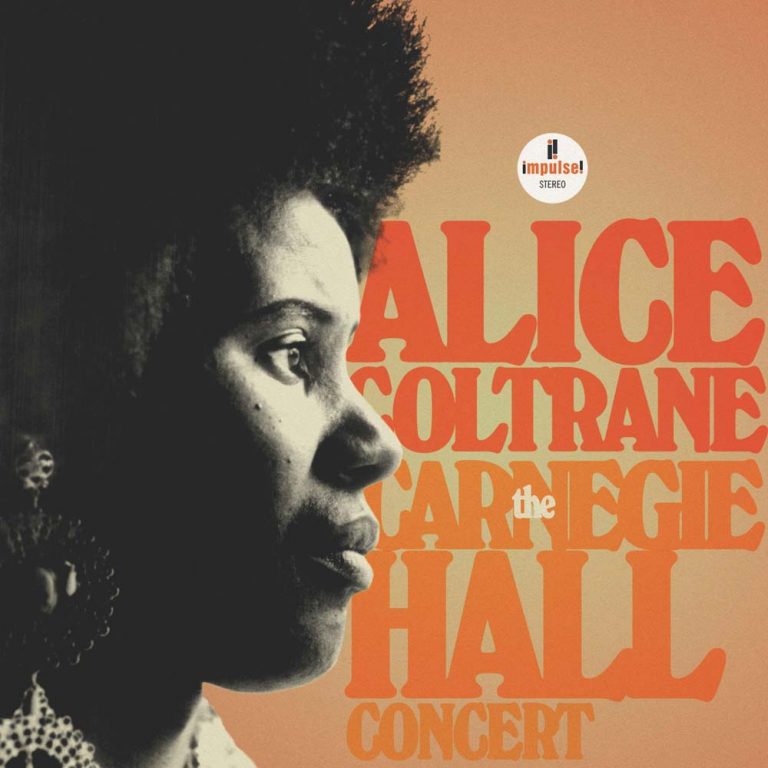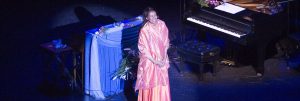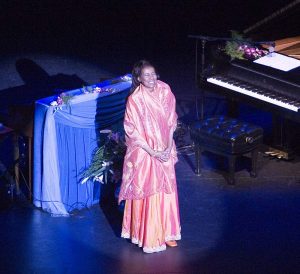Adorned with a garland of flowers and a glowing aura as warm as her beautiful orange robes, Alice Coltrane enters the backstage area of Royce Hall with the presence of a spiritual leader. It’s a role she took on in 1976 when she founded the Vedantic Center ashram in California, and one she pursued under the name Swamini Turiyasangitananda until her sad passing in 2007.
She had just blessed the adoring crowd with a special concert in this grand old concert hall to mark her long awaited return to recording with the 2004 album “Translinear Light”. Coltrane’s first album for 26 years, it continued her investigations of Eastern spiritual music following the passing of her husband John in 1968.
Tonight was to be the premiere live performance of numbers from the album that featured her son Ravi Coltrane on saxophone, Reggie Workman on bass, and Jeff “Tain” Watts on drums, with Alice on organ and synthesizer. I’m in Los Angeles to visit jazz vocalist Dwight Trible who I am managing at the time and who has been given the honour of supporting Alice with his Quintet.

I had seen Dwight and his Quintet a number of times including at the famous Jazz Bakery in L.A. but in this setting and in this context supporting one of his musical heroes, there is an added spiritual intensity to his performance. The Quintet sets things up perfectly for the arrival of Alice and her band.
Introduced by her son Ravi, Alice takes her seat on the side of the stage where a Wurlitzer organ and analogue synthesizer await next to the grand piano. Arriving at Royce Hall, I knew Alice mainly for her spiritual jazz harp and piano albums like “A Monastic Trio” (1968) and “Journey In Satchidananda” (1971). To hear Alice playing organ and synthesizer was to be a revelation that sent me on a journey of discovery.

ALICE COLTRANE The Carnegie Hall Concert
Available to purchase from our US store.Retrospectively, Ravi’s introduction feels even more moving because of the fact that his mother was to pass away in January the following year. Alice moves into the title track of “Translinear Light”. The musical partnership that began between wife and husband in the late sixties has now transferred to mother and son, and the swirl of Alice’s Wurlitzer around Ravi’s mournful tenor is profound.

Their version of the title track off John Coltrane’s 1964 album “Crescent” follows, with the intuitive interaction of Alice and Ravi augmented by the delicate playing of Reggie Workman and Jeff “Tain” Watts. The spiritual intensity reaches a peak on “Sita Ram” from Alice’s 1971 album “Universal Consciousness”. That album was the first time I had heard Alice’s organ music, and with the sound of the Wurlitzer echoing around the acoustically pure Royce Hall, I became determined to dig deeper into this aspect of her work.
The next day I’m picked up from my Wilshire Hotel by percussionist and producer Carlos Niño, who was then leading intergenerational collective Build An Ark – and who just recently rose to new prominence because of his involvement with the André 3000 album “New Blue Sun”. He had been with us at Royce Hall and in the foyer afterwards invited me on a road trip across L.A. in search of Alice’s lesser known organ albums.
At our first crate-digging stop Freakbeat Records in Sherman Oaks, we strike gold. Pulling out two albums with Alice on the cover dressed in her Swamini orange robes, Carlos says simply: “You need these.” The records turned out to be a promotional copy of “Transcendence” and “Radha-Krsna Nama Sankirtana”, two of the organ albums produced by Ed Michel for Warner Brothers in the mid-1970s.

Apart from a live recording from 1978, these spiritually charged albums would be the last Alice recorded until 1982, when she started making privately-pressed cassettes of her devotional music for her students at the Vedantic Center. Released under the name “Turiya Sings”, they later became part of a 2017 compilation of four Ashram cassette recordings released on David Byrne’s Luaka Bop label. Then in 2021, Ravi Coltrane discovered previously unheard vocal and organ versions that were released on the outstanding double album “Kirtan: Turiya Sings” on Impulse!.
That will be for another story told here, but for now I will leave you with the cover of my gateway album to the spiritual organ music of Alice Coltrane. Possibly the best $8.99 I ever spent. Thank you Carlos, thank you Freakbeat, thank you Alice.

ALICE COLTRANE The Carnegie Hall Concert
Available to purchase from our US store.Read on… The Art of Jazz Harp
Andy Thomas is a London based writer who has contributed regularly to Straight No Chaser, Wax Poetics, We Jazz, Red Bull Music Academy, and Bandcamp Daily. He has also written liner notes for Strut, Soul Jazz and Brownswood Recordings.
Header image: Alice Coltrane in a World Premiere Performance of her album Translinear Light at UCLA Live in Los Angeles – February 18, 2006. Photo: Skip Bolen/WireImage via Getty.


